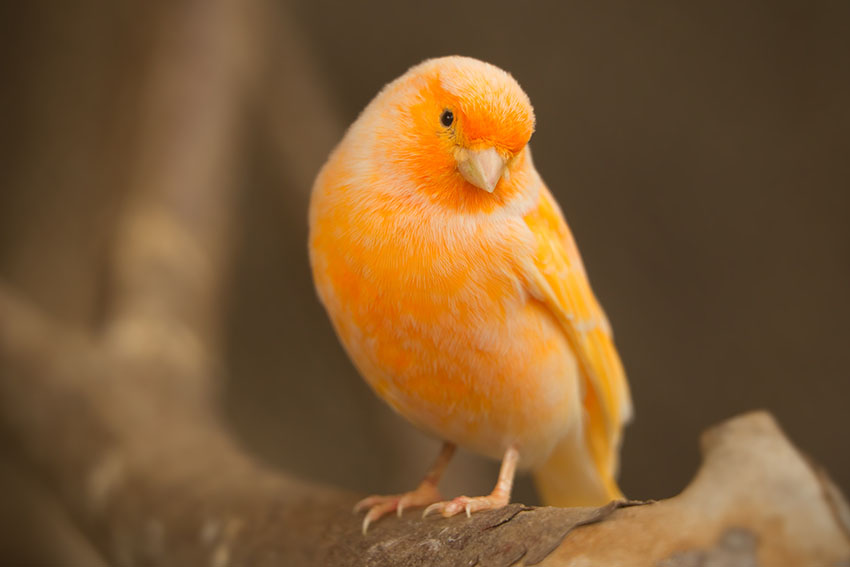Bald Patches
This condition will usually affect the birds head and neck (if baldness appears elsewhere it is more likely to be because of mites). These bald patches are caused by a vitamin D deficiency. Placing the bird’s cage near a window (but out of direct sunlight) is one way to aid this. Some birds will be more prone and may lose feather seven if you do this. The bald patches don’t have an affect on the birds health and many live a happy life as the “vulture” of the cage.

A hand-examination of a pet finch is a useful way of performing a quick health-check
Beak Growth
Abnormal beak growth is rare, but if it does happen to strike it will cause the affected finches upper beak to extend, a bit like Pinocchio's nose. The cause is usually due to bad diet, though can in some rare cases be a symptom of the Polyoma virus. Make sure that your birds are receiving enough calcium and minerals and be sure to provide them with a mineral block and cuttlefish bone. A vet will need to trim the beak so that the bird can feed properly.
Bone Fractures
Like all birds, especially small ones, Finches have very fragile bones that can easily be broken in a fit of panicked flapping. It will be fairly obvious when your bird has a broken bone, most likely a wing or leg will be affected in which case the limb will be hanging limply. Chances of recovery will vary from case to case, depending on the severity and position of the break. A vet will apply a splint and in a good case scenario the bird will be fully healed within a few weeks.
Colds and Chills
Just like us humans, birds can be susceptible to the cold. If there is a constant fluctuation in room or cage temperature, an excess of damp, or a lot of drafts, your birds could suffer from a cold/chill. These problems lower the bird’s immune system, making it much easier for other diseases to make their way into their system. This is a difficult condition to diagnose, though in general they seem to resemble symptoms of other, full-blown infections or viruses - i.e. lethargy, fluffed-up feathers, loss of appetite and loose droppings. If you suspect that your bird has come down with a cold you will need to move them somewhere warm and you should consult your vet on the ideal antibiotics. Also make sure that the source of the problem, such as a draft or a cold room temperature, are addressed.

Check your birds for signs such as fluffed-up feathers and lethargy
Crop Problems
These are most common amongst fledgling birds. There are many things that can go wrong - chilly food lodging and turning sour (a condition called “sour crop”); crop impaction due to the ingestion of material such as sawdust, grit or paper; or even a slow crop transit due to dehydration. Vets will recommend a course of action, depending on the cause of the problem. This can range from an oral dose of oily liquid, to throat massage, or even the crop equivalent of a laxative.
Egg-binding
This is also called dystocia, this condition makes it impossible for a bird to lay its egg. Hens that are affected with this will squat on the floor of their cage and show general signs of distress. This condition is usually due to a poor diet with a lack of calcium and oil, and seems to be more prevalent during colder weather. Prevention is the best cure for this, as you can’t help an egg-bound bird lay her egg. The best way to prevent this is mixing some cod liver into their usual foods. Up the calcium intake as well, egg-shells are a good source. Some hens can die in this state, others will eventually pass the egg.
Wounds
Any sort of wound can become infected and lead to septicaemia. This will kill off your bird quickly. If you spot any traces of blood in the bird’s cage or notice a cut on your birds, be sure to address it quickly. Make sure that your bird’s cage is clean, and make sure that there are no sharp edges or objects that your birds could cut themselves on.



Comments
Julie, 12 January 2022
Hi my canary has a bald patch on the left side just above her beak what could this be plz
Tanya, 9 April 2021
My finches have white spot on their beck’s what dose this mean
Karen, 10 March 2019
Our male bird is picking on the back of our females neck and it’s causing a bald spot. So we separated them in different cages so he wouldn’t hurt her anymore. Why has he started to do that to her? She seems hurt and makes a lot of noise and flys away from him when they are in the same cage. Please can you explain why?